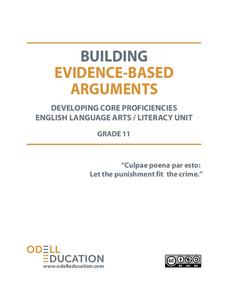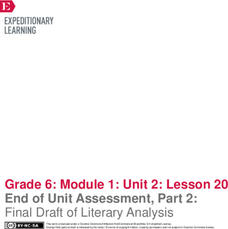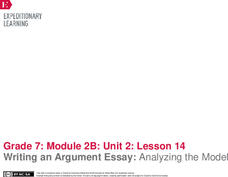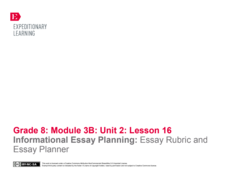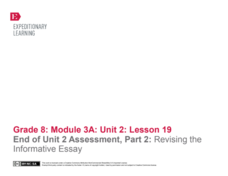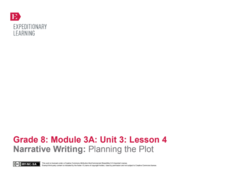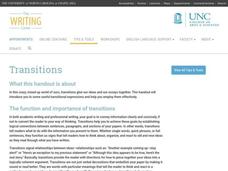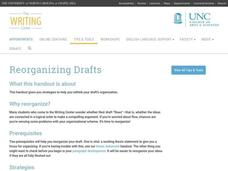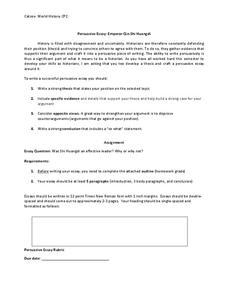Odell Education
Building Evidence-Based Arguments: "Cuplae poena par esto: Let the punishment fit the crime."
Should a criminal's punishment match the crime? An argumentative writing plan explores this question as class members investigate a variety of mixed-medium sources by experts in the field, form evidence-based claims, and support them...
K20 LEARN
Seeing the Big Picture - Incorporating Thesis, Evidence, Elaboration, and Concluding Statements in Your Essay: Elements of an Essay
Writers examine the elements of an informational essay, identify them in several essay snapshots, and then craft their own to demonstrate what they have learned.
EngageNY
The Painted Essay: Developing a Conclusion and Adding Linking Words
In conclusion ... this essay is the best! Scholars continue working on their painted essays by creating the conclusion. They work in groups to analyze the concluding paragraph in the model painted essay, The Electric Motor. After...
EngageNY
End of Unit Assessment, Part 2: Final Draft of Literary Analysis
Row, row, row, row four. Classmates take a look at row four in the writing rubric and begin the exercise by identifying any unfamiliar words. Literary scholars then use feedback from their initial drafts and the writing rubric to begin...
EngageNY
Finishing the End of Unit 3 Assessment: Final Draft of Position Paper and Reflection on the Writing Process
Scholars work on the end of the unit assessment by reflecting on their writing. They answer questions about the process they used to complete their position paper essays. After completing the end of unit assessment, they add images to...
EngageNY
Writing the Argument Essay: Moving from Planner to Drafting
It's an easy transition. Scholars identify transition words in the Pygmalion model essay and record definitions in the Transitions anchor chart. They then begin to look at the tone of the model essay. Finally, individuals begin writing...
EngageNY
Writing an Argument Essay: Analyzing the Model
Class members analyze the model essay to determine the given claim and the evidence to support it. They use an Analyzing Evidence in the Model Essay sheet to help guide their work. They then begin to analyze the structure of the essay by...
EngageNY
Writing an Argument Essay: Introducing the Writing Prompt and Model Essay
Scholars take a look at the difference between explanatory and argumentative essays by completing graphic organizers. They then determine how this difference applies to the Pygmalion writing prompt. Learners keep track of their writing...
EngageNY
Analyzing Text Structure: “Generation Z Stereotyped”
Breaking the stereotype. Readers use the Generation Z Stereotyped Structure anchor chart and find the central idea of the text. They then read Generation Z with partners and discuss the text using guiding questions. Finally, they answer...
EngageNY
Informational Essay Planning: Essay Rubric and Essay Planner
Class members dig into the expectations for the end-of-unit assessment for A Mighty Long Way by studying the rubric. The Rubric Criteria strips help pairs of readers look more closely at specific rubric points. They share ideas with the...
EngageNY
Informational Essay Planning: Analyzing and Selecting Evidence
Class members look again at the end-of-unit essay prompt for A Mighty Long Way. After reviewing the requirements of the essay, they use their Gathering Evidence note-catchers and color-code the evidence that matches the two questions in...
EngageNY
End of Unit 2 Assessment, Part 2: Revising the Informative Essay
Is that your final answer? Scholars discuss the terms, edit, and revise. They then complete their final drafts as the end-of-unit assessment of Unbroken. Writers use their graded draft essays from a previous instructional activity to...
EngageNY
Narrative Writing: Planning the Plot
You will never forget that moment. Scholars read a model narrative and analyze the moment a character became visible again. They compare the narrative to Okubo in Unbroken. Readers also assess the narrative essay according to a rubric...
EngageNY
End of Unit 2 Assessment, Part One: First Draft of Analysis Essay
How do writers use evidence from literary texts to support analysis and reflection? With instructional activity 17 of 20 from the Grade 8 ELA Module 1, Unit 2 series, learners gather resources to prepare for an end-of-unit assessment....
EngageNY
Planning the Introductory and Concluding Paragraphs of the End of Unit Assessment Essay
Preparation is the key to success! Using the guiding resource, scholars plan their end-of-unit analytical essays' introductory and concluding paragraphs based on their reading of Inside Out & Back Again. To prepare, they complete a...
Scholastic
Lesson 3: Essay Organizer
A three-minute exercise warms-up scholars' writing abilities in order to follow a writing process that ends in an essay. The essay's topic is a barrier and the values used to break it. Four steps include choosing a topic, jotting-down a...
University of North Carolina
Literature (Fiction)
An informative installment of the Writing for Specific Fields series helps readers learn how to interpret and write about fiction. The website details nine easy steps for writing a literary analysis—a useful method for all readers!
Minnesota State University
Writing Sample Constructed-Response Assignment
Class members practice their writing skills by completing a prompt about maturity. They develop a constructed response about something they once thought was important, but may not be as important now.
Fabius-Pompey School District
Paired Passage Practice and the Extended Response Question
How do pupils relate paired passages to each other? Here's a resource that helps! The lesson includes a short story and a poem as a set of paired reading passages, followed by some analysis questions. It also includes an essay template...
University of North Carolina
Transitions
Ideas don't naturally flow from one to another. They need transitions to help them connect. Part of a larger Writing the Paper series, the resource introduces writers to the concept of using transitions in their writing. Topics covered...
University of North Carolina
Reorganizing Drafts
Poor organization often destroys an otherwise good paper. After writing a first draft, individuals consider the organization of ideas, a topic discussed in the 16th handout in the 24-part Writing the Paper series. The resource covers...
Trinity University
Explain Yourself: An Expository Writing Unit for High School
Introduce expository writing with a unit that asks writers to craft an essay to explain a belief, value, or priority that is important to them. Mini-lessons within the unit focus on crafting thesis statements and conclusions, selecting...
Curated OER
Persuasive Essay
Next time you assign your young historians to write a persuasive essay, use this document as a starting point and support them with a rubric, tips for writing a successful persuasive piece, and a general essay outline.
Curated OER
Revision Checklist for the Accordion Essay
Encourage your class to revise their writing and check over their work by requiring them to complete an organization checklist. The checklist, created specifically for a accordion-style essay, asks writers to look over their formatting,...


